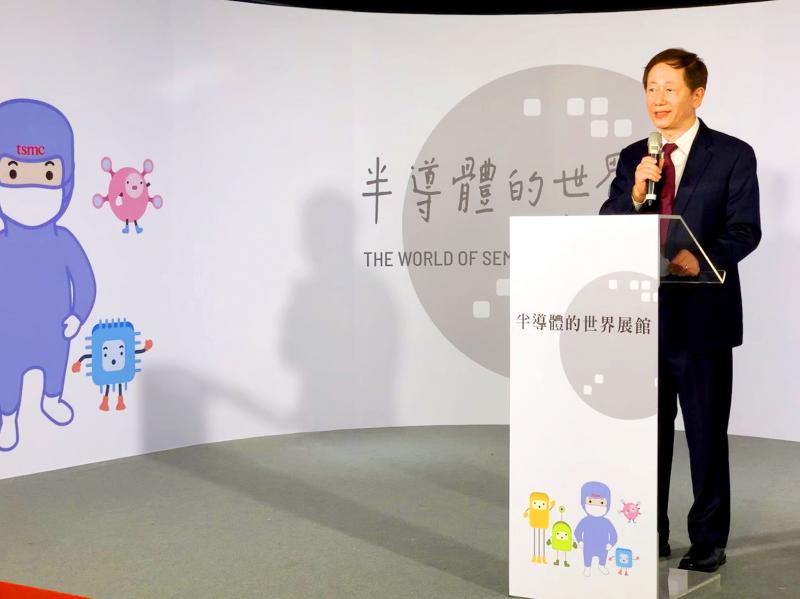Taiwan Semiconductor Manufacturing Co (TSMC, 台積電), the world’s largest contract chipmaker, yesterday said it is to raise employees’ regular wages by an average of 20 percent in an effort to acquire and retain talent.
That would be the biggest hike in regular paychecks in the company’s history, as the fight for technology talent becomes increasingly fierce and talent poaching seems normal.
The last such move came in 2009, when it boosted employees’ regular pay by 15 percent, before scrapping long-term practices of stock bonus distribution for employees in 2010 in response to a major change in accounting rules. Since then, the chipmaker has been paying bonuses in cash.

Photo: Lisa Wang, Taipei Times
The Hsinchu-based chipmaker said that the latest wage hikes would be accompanied by a slight downward adjustment of its bonus payment ratio, which would result in compensation packages for employes remaining close to their current levels.
The payroll adjustment, to take effect in January, would help the company to recruit young professionals as they tend to favor receiving a higher fixed income, the chipmaker said.
Employees with entry-level positions should benefit more from the wage adjustments, it added.
The company said it is planning to recruit 8,000 workers this year as it is ramping up advanced 5-nanometer technology to cope with robust demand for 5G smartphones and high-performance computing applications.
The worldwide median annual compensation for TSMC employees, excluding pensions and benefits, is NT$1.63 million (US$56,505), the company’s corporate social responsibility report on its Web site said.
The average monthly salary in TSMC’s facilities in Taiwan was three times as much as than the minimum wage in Taiwan last year, the report said.
The structural wage adjustment would not affect the annual paycheck adjustments, it said.
The chipmaker has raised the paychecks of Taiwan-based employees at an annual rate of 3 to 5 percent over the past few years, the report said.
TSMC hired 5,087 new employees last year, bringing its total workforce to 51,297 at the end of last year.

WEAKER ACTIVITY: The sharpest deterioration was seen in the electronics and optical components sector, with the production index falling 13.2 points to 44.5 Taiwan’s manufacturing sector last month contracted for a second consecutive month, with the purchasing managers’ index (PMI) slipping to 48, reflecting ongoing caution over trade uncertainties, the Chung-Hua Institution for Economic Research (CIER, 中華經濟研究院) said yesterday. The decline reflects growing caution among companies amid uncertainty surrounding US tariffs, semiconductor duties and automotive import levies, and it is also likely linked to fading front-loading activity, CIER president Lien Hsien-ming (連賢明) said. “Some clients have started shifting orders to Southeast Asian countries where tariff regimes are already clear,” Lien told a news conference. Firms across the supply chain are also lowering stock levels to mitigate

Six Taiwanese companies, including contract chipmaker Taiwan Semiconductor Manufacturing Co (TSMC, 台積電), made the 2025 Fortune Global 500 list of the world’s largest firms by revenue. In a report published by New York-based Fortune magazine on Tuesday, Hon Hai Precision Industry Co (鴻海精密), also known as Foxconn Technology Group (富士康科技集團), ranked highest among Taiwanese firms, placing 28th with revenue of US$213.69 billion. Up 60 spots from last year, TSMC rose to No. 126 with US$90.16 billion in revenue, followed by Quanta Computer Inc (廣達) at 348th, Pegatron Corp (和碩) at 461st, CPC Corp, Taiwan (台灣中油) at 494th and Wistron Corp (緯創) at

NEW PRODUCTS: MediaTek plans to roll out new products this quarter, including a flagship mobile phone chip and a GB10 chip that it is codeveloping with Nvidia Corp MediaTek Inc (聯發科) yesterday projected that revenue this quarter would dip by 7 to 13 percent to between NT$130.1 billion and NT$140 billion (US$4.38 billion and US$4.71 billion), compared with NT$150.37 billion last quarter, which it attributed to subdued front-loading demand and unfavorable foreign exchange rates. The Hsinchu-based chip designer said that the forecast factored in the negative effects of an estimated 6 percent appreciation of the New Taiwan dollar against the greenback. “As some demand has been pulled into the first half of the year and resulted in a different quarterly pattern, we expect the third quarter revenue to decline sequentially,”

ASE Technology Holding Co (ASE, 日月光投控), the world’s biggest chip assembly and testing service provider, yesterday said it would boost equipment capital expenditure by up to 16 percent for this year to cope with strong customer demand for artificial intelligence (AI) applications. Aside from AI, a growing demand for semiconductors used in the automotive and industrial sectors is to drive ASE’s capacity next year, the Kaohsiung-based company said. “We do see the disparity between AI and other general sectors, and that pretty much aligns the scenario in the first half of this year,” ASE chief operating officer Tien Wu (吳田玉) told an